What lessons on ethics can quantum technology learn from AI’s entrance into society?

(TechRadar) Gemma Church, of Universal Quantum, wrote recently about the ethics of introducing quantum computers into society and what lessons can be learned from AI’s entrance. IQT-News summarizes below.
A few years ago, many people imagined a world run by robots. The promises and challenges associated with artificial intelligence (AI) were widely discussed as this technology moved out of the labs and into the mainstream.
AI hit the headlines for all the right (and wrong) reasons, promising everything from revolutionizing the healthcare sector to making light of the weight of data now created in our digitized world.
But, from Amazon’s sexist AI recruiting tool to racial bias and Tesla’s driverless car crash, many other examples of the pitfalls of poorly implemented AI soon appeared. But many examples of the pitfalls of poorly implemented AI soon appeared.
Fast forward to 2021 and the Institute for Ethics in AI was set up at the University of Oxford with many similar initiatives now appearing to tackle the issues of how we can use AI in an ethical and safe manner.
AI is not the first technology to undergo this push-and-pull between revolutionizing and/or destroying the world. As the Institute for Ethics in AI website states: “Philosophers made a major contribution to the development of medical ethics 40 years ago, and we are now at a tipping point where a similar ethical intervention is needed to cope with the questions raised by the rise of AI.”
A quick look on Google Trends reveals current interest in quantum computing ethics is pretty much zero. There have been a few bylines around the issues of ethics in quantum computing but early calls from the scientific community require more attention and action.
But quantum computers with millions of qubits are decades away, right? So, there’s no need to worry now, right?
Wrong, on both counts. Many quantum computing companies have ambitious roadmaps to get to the million-qubit range.
There are many ways to make a quantum computer. In recent times, we’ve seen companies scaling up their quantum computers, one qubit at a time. But as quantum technology matures and different approaches are used, other companies have bolder ambitions to create architectures capable of scaling incredibly fast using novel, modular designs.
The time to imagine a world with a million-qubit quantum computer is now. Someone’s going to win the race to one million qubits, and we can’t ignore the quantum revolution forever. As Neil Armstrong once said when addressing the Joint Sessions of Congress in 1969 after the Apollo 11 mission, “Science has not yet mastered prophecy. We predict too much for the next year and yet far too little for the next ten.”
Because quantum computers will change the world. Whether that’s for better or worse is not in the hands of quantum computers, but the humans who will use these machines.
As the hype around quantum computing reaches fever pitch, it’s worth remembering that to unlock the true potential of these machines, they need to get bigger. Much bigger. Recent research undertaken by Universal Quantum and collaborators demonstrates that a quantum computer with 13 million physical qubits could break Bitcoin encryption within a day, and it would take a 300 million qubit computer to break it within an hour. The work automates the calculation of how many qubits are required as a function of different hardware assumptions with considerable progress in reducing the physical size of quantum computers.
Because quantum computers will change the world. Whether that’s for better or worse is not in the hands of quantum computers, but the humans who will use these machines. As Neil Armstrong once said when addressing the Joint Sessions of Congress in 1969 after the Apollo 11 mission, “Science has not yet mastered prophecy. We predict too much for the next year and yet far too little for the next ten.”
<https://www.techradar.com/features/apocalypse-now-what-quantum-computing-can-learn-from-ai>
Sandra K. Helsel, Ph.D. has been researching and reporting on frontier technologies since 1990. She has her Ph.D. from the University of Arizona.



















